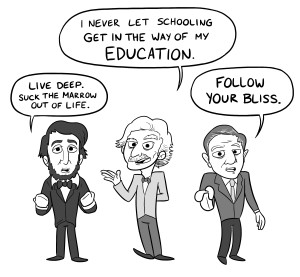For high school seniors, May decision day has passed. They’ve picked a college and written their first check. But if they think ‘the process’ was pressure packed for the past several months, they ain’t seen nothin’ yet. Now the screws will really begin to turn, pressure will mount, and those young people will need every fiber of their being to fight back. Their future will truly depend on it.
The pressure will come from parents, politicians and pundits in the press who will all be talking about money. They’ll toss around tidy phrases like “bang for your buck” and “return on investment” and “getting your money’s worth.” Of course, they will mention ‘value’, and rightfully so.
But beware the trappings of what comes next. Talk will turn to taking the right major with the right classes in order to get the right job right after college. The problem with all this ‘right’ talk is that it will steer an upstart collegian so incredibly wrong. It masquerades as a constructive form of financial focus to ensure success after college, but it’s actually a dangerous myopia that limits thinking, opportunities and dreams even before that student arrives on campus in the fall. And, at the worst possible time, it will sow seeds for a mental paralysis that can permeate the entire collegiate experience.
The current excessive emphasis on getting short-term economic value out of college will have students attending to their safety net at the precise time when they should be thinking about swinging on the trapeze.
College is a special odyssey of experimentation, exploration, risk-taking and discovery. If students become paralyzed by financial concerns, they will miss out on the true benefits and enrichment they’re paying for. They may pick a STEM major, but lack the passion for it. They may forego extracurricular involvement in order to focus on academics. They may not take on that music or religion minor for fear it may interfere with getting good grades, or they may shun the liberal arts, saying no to philosophy or English or that History of Pop Music course they would have loved in high school but now consider ‘fluff’.
These are bad ideas all around. They would be, as Mark Twain put it, allowing schooling to get in the way of one’s education. They would be hanging out on the safety net while never reaching for the trapeze.

Twain, Campbell and Thoreau (who’s not mentioned here, but likes to be included with the Three Amigos…. And he has some good advice in his little voice bubble!)
The college experience encompasses a rich collection of endeavors inside and outside the classroom that shape and prepare young people for success later in life. Without extracurricular interaction, they’re unlikely to develop the ‘soft skills’ so many employers seek, the nimbleness that comes from managing time across activities, and the essential ‘distractions’ that become as enriching as their studies (and may even become part of a career down the road). Dipping their toes into the interesting and diverse waters of the college curriculum affords an array of experiences that will be invaluable for years to come. The ability to see connections across disciplines, to synthesize those connections and imagine new possibilities, and to communicate it all deftly and effectively – that is what such toe-dipping can do. It helps cultivate skills that propel people into management, leadership and visionary ranks well beyond their first job.
More detrimental than foregoing these skills, however, is the possibility that students may be dooming themselves to middle-aged misery where they’ve lost track of what they loved, replaced their passion with practicality, and looked up two decades later wondering how they got there.
So, what’s a young, college-bound person to do? The recipe is an amalgam of Joseph Campbell’s ‘Follow your bliss’ and a dash (or dollop) of practicality. Of course, they should be prudent about selecting a major. But if it’s devoid of passion, it will be a losing proposition. They should be judicious about finances, too. No one is suggesting throwing college money down the drain. But if concern over money makes them too risk averse, tentative, and myopic, they will forgo enrichment that could be essential to building a future.
They should dabble. Explore. Double major. Double minor. Road trip. Study abroad. Shadow professionals over break. Get to know professors. Do one thing each month that’s out of their comfort zone. Paint their faces on game day. Flip from one interest to another. Grab hold of opportunities that don’t make practical sense but seem interesting and cool in the short term. Steve Jobs didn’t know that a calligraphy course he took on a whim would pay off years later when he launched that first Apple computer. And that’s the point. There’s no way to know. So students should err on the side of opening up, rather than limiting, their possibilities.
By taking a turn on that trapeze every chance they get, their college years will be filled with trials and errors and diverse, engaging experiences. Will it be risky? Sure. But it will also be thrilling and, oh, so rewarding, too.
Some might even call it valuable.








